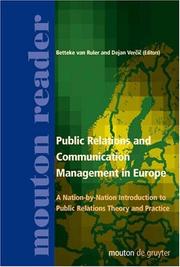| Listing 1 - 5 of 5 |
Sort by
|
Book
ISBN: 9780415884242 9780203545461 9781351743952 9781135935535 Year: 2017 Publisher: New York : Routledge,
Abstract | Keywords | Export | Availability | Bookmark
 Loading...
Loading...Choose an application
- Reference Manager
- EndNote
- RefWorks (Direct export to RefWorks)
Journalistic ethics. --- Public relations --- Journalism --- Moral and ethical aspects. --- Objectivity. --- Journalistic ethics --- Journalistes --- Relations publiques --- Presse --- Déontologie --- Aspect moral --- Objectivité --- Déontologie. --- Aspect moral. --- Objectivité. --- Déontologie. --- Objectivité.
Book
ISBN: 1003018920 1003018920 100017395X Year: 2021 Publisher: London ; New York, New York : Routledge,
Abstract | Keywords | Export | Availability | Bookmark
 Loading...
Loading...Choose an application
- Reference Manager
- EndNote
- RefWorks (Direct export to RefWorks)
"This book serves as a reader exploring the scholarly inquiry, professional education and practice of Russian public relations and advertising in multiple contexts. It examines significant parts of what can be encompassed under the umbrella of strategic communications, including public relations and advertising, rather than investigating all areas of communication in Russia. Within the context of Russia's history, culture and ideology, the book begins by tracing the development of communication as a field, as a discipline, and as a social institution in Russia. It then samples current studies in Russian strategic communications, examining this professional specialization's current state and likely future directions. The book's authors are mostly Russians who are experts in their specializations. Chapters are predicated upon the premise that this is an exciting time of great opportunity for Russian strategic communications. However, in Russia, exploiting such opportunities for strategic communications scholarship, education, and professional practice presents challenges within the context of that nation's cultural, historical, and ideological heritage that presently may be unique. The book concludes with a prognosis of the future of Russian strategic communications. The book is recommended reading for a worldwide audience of strategic communications scholars, educators, students, and practitioners. Such readers will find the book of interest and of unique value as the book will help them to better understand, appreciate, and respect Russian strategic communications, its genesis, and present state"--
Book

ISBN: 3110729741 3110731274 Year: 2022 Publisher: Berlin/Boston De Gruyter
Abstract | Keywords | Export | Availability | Bookmark
 Loading...
Loading...Choose an application
- Reference Manager
- EndNote
- RefWorks (Direct export to RefWorks)
Nationalism was declared to be dead too early. A postnational age was announced, and liberalism claimed to have been victorious by the end of the Cold War. At the same time postnational order was proclaimed in which transnational alliances like the European Union were supposed to become more important in international relations. But we witnessed the rise a strong nationalism during the early 21st century instead, and right wing parties are able to gain more and more votes in elections that are often characterized by nationalist agendas. This volume shows how nationalist dreams and fears alike determine politics in an age that was supposed to witness a rather peaceful coexistence by those who consider transnational ideas more valuable than national demands. It will deal with different case studies to show why and how nationalism made its way back to the common consciousness and which elements stimulated the re-establishment of the aggressive nation state. The volume will therefore look at the continuities of empire, actual and imagined, the role of "foreign-" and "otherness" for nationalist narratives, and try to explain how globalization stimulated the rise of 21st century nationalisms as well.
HISTORY / Social History. --- immigration. --- nationalism. --- populism. --- 2000-2099


ISBN: 9783110197198 9783110176117 Year: 2008 Publisher: Berlin ;; Boston De Gruyter Mouton
Abstract | Keywords | Export | Availability | Bookmark
 Loading...
Loading...Choose an application
- Reference Manager
- EndNote
- RefWorks (Direct export to RefWorks)
Digital

ISBN: 9783110554250 9783110552607 9783110552294 Year: 2021 Publisher: Berlin ;; Boston De Gruyter Mouton
Abstract | Keywords | Export | Availability | Bookmark
 Loading...
Loading...Choose an application
- Reference Manager
- EndNote
- RefWorks (Direct export to RefWorks)
| Listing 1 - 5 of 5 |
Sort by
|

 Search
Search Feedback
Feedback About UniCat
About UniCat  Help
Help News
News